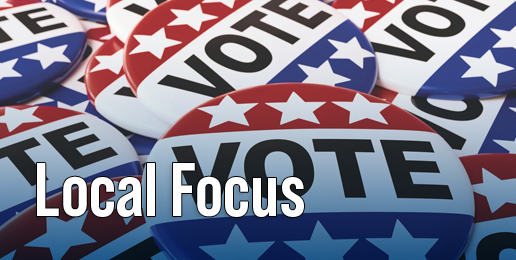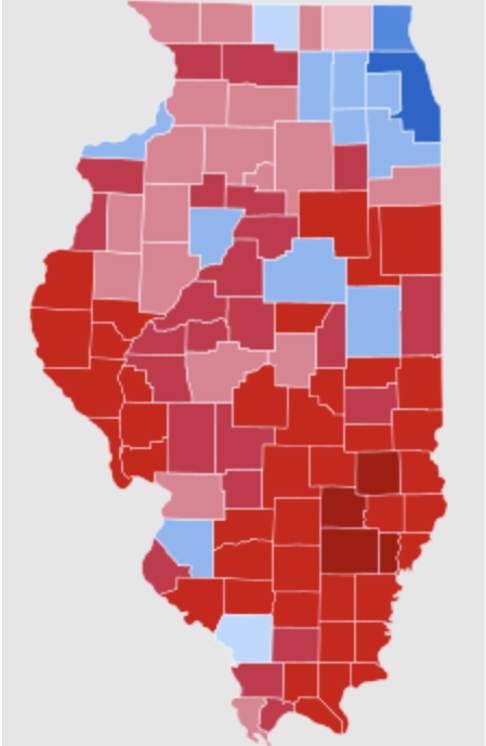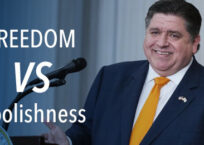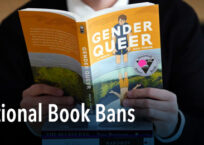
Why are local elections so uninteresting to voters?
Local elections in Illinois generally draw about 16% of registered voters. This is compared to the average turnout over the last 20 years for presidential elections in Illinois of 63% and the average turnout in the off-year elections of 44%.
We just don’t seem to care much about local elections at all.
Presidential elections have poor turnout, as far as I am concerned.
Even so, why is there so much more interest in presidential elections versus local elections? Each one of us has a much greater chance of affecting local government decisions than any decision made by the federal or state governments.
Look at the recent controversy over the so-called book bans. Illinois’ “ban of book bans” just took effect at the first of the year. It was passed in response to local efforts to force libraries to prevent children from having access to obscene books and other materials.
Because of that law and because of our Democrat governor and a super majority of democrat representatives, all of whom favor the sexualization of children, it’s unlikely that conservatives will have much statewide influence in our efforts to protect childhood innocence any time soon.
However, there are still large areas of the state where we have enough influence to protect children. Look at the 2020 Presidential election map for Illinois:

In that year President Biden received 57.5% of the vote, while President Trump only got 40.6%.
Nevertheless, there are large parts of the state that remain conservative, even in that lopsided race. When you consider that protecting childhood innocence is not, or at least should not be, partisan, the portion of the state that would vote to protect children from exposure to obscene material should encompass the whole state.
I have no doubt that a large majority of this state—Republicans, Democrats, Independents, whatever—if they knew what these books contained, would favor protecting children. On this issue, most people are conservative.
The decision about what books are placed on the library shelves in public libraries and public school libraries is in the hands of local school boards and local library boards. Yet most of these libraries contain indisputably obscene materials that are readily available to children of any age. This happens because the actual decisions are left to the librarians, many of whom are progressives.
How else did they elect an admitted Marxist as the president of the American Library Association?
The only reason there has been so much opposition to efforts to restrict children from accessing certain books is that the issue has been framed as an anti-LGBTQ initiative. Many of the books that have drawn objections are books like “Gender Queer,” “Lawn Boy,” “This Book is Gay,” and others. These are LGBTQ-themed books.
It is not just the LGBTQ-themed books that are of concern.
There are also books like 1955’s Lolita by Vladimir Nabokov, for example. That book is a novel about a stepfather who kidnaps his 12 year old stepdaughter, Lolita, because of his sexual obsession with her. Lolita is a “nymphet” who excitedly consents (not that she actually can because she is a minor) to the sexual tryst. The book was named in the top 100 novels for multiple book lists—Time’s List of 100 Best Novels, Modern Library’s 100 Best Novels, Le Monde’s 100 Best Books of the Century.
This book is not appropriate for children either. Technically, it falls into the LGBTQ category, since that group claims “minor attracted persons” as one of the identity groups that has been jammed under the LGBTQ umbrella of interest. All these books, LGBTQ-themed or not, are obscene and should not be available to any minor.
But they are.
Most people who are opposed to these materials being available to children are not suggesting that all these books be removed from libraries entirely. At least I am not. If you are an adult and want to read such books, that’s up to you. But they should be located in an area of the library where children are actively prevented from entering.
In years past libraries had sections that were available exclusively to adults. In most libraries that is not the case anymore. The policy of the American Library Association (ALA) prohibits its members from doing so. Their policy states as follows:
The American Library Association supports equal and equitable access to all library resources and services by users of all ages. Library policies and procedures that effectively deny minors equal and equitable access to all library resources and services available to other users is in violation of the American Library Association’s Library Bill of Rights. The American Library Association opposes all attempts to restrict access to library services, materials, and facilities based on the age of library users.
Article V of the Library Bill of Rights states, “A person’s right to use a library should not be denied or abridged because of origin, age, background, or views.” The right to use a library includes free access to, and unrestricted use of, all the services, materials, and facilities the library has to offer. Every restriction on access to, and use of, library resources, based solely on the chronological age, apparent maturity, educational level, literacy skills, emancipatory or other legal status of users violates Article V. This includes minors who do not have a parent or guardian available to sign a library card application or permission slip. Unaccompanied youth experiencing homelessness should be able to obtain a library card regardless of library policies related to chronological age.
Even if an adult section is created in a library that follows the ALA Bill of Rights, children can look at anything in that section.
It does not have to be that way. Libraries are subject to local control. A few months ago in Gillette, Wyoming a majority of the library board voted to remove all obscene material from the stacks. The librarian refused to do it and was fired.
This could happen in every library. Fire them.
Having a conservative board isn’t enough to ensure that children will be protected. In my local library, we finally have a majority of conservatives, but they are not taking control over what books are made available to children. Why not?
One of the board members recently told me that there are a variety of constituents, and the library has to accommodate them all.
No, they don’t.
The policies allowing these materials on library shelves that are accessible to children are a threat to the welfare of every child. Until a majority of voters and elected officials wake up to this fact, every child will remain at risk.
























